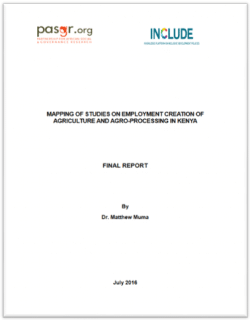
Although agriculture plays a significant role in Kenya’s economy and offers about 60% of the formal wage employment in the country, the sector’s annual growth rate of labour absorption is very low estimated to be 2%. This report synthesises available evidence on employment creation in the agricultural sector and agro-processing in Kenya. The report is part of the activities of the policy-knowledge community (Utafiti-Sera) on employment creation in Keyna, which aims to inform and influence policies and programmes in employment creation.
The report shows that job creation potential of agriculture in Kenya is limited by low productivity, inadequate public investment, challenges in accessing credit, excessive taxation, inappropriate regional and foreign policies, limited access to supportive services, requisite skills and advanced technologies challenges and cartels along value chains that make it difficult for new entrants. Policies to overcome these challenges should focus on enhancing access to affordable and quality inputs, promoting access to appropriate technologies and credit, infrastructure and skills development, fair taxation of produce and agricultural insurance. Further, promote industrialisation, negotiate for fair trade policies, enhance productivity and economies of scale, land reforms, fair competition, adoption of advanced technologies. The links between agriculture and agro-processing should also be promoted and any bottlenecks addressed. The overall objective is to create a vibrant agriculture and agro-processing sector, which offers viable and attractive employment opportunities.








